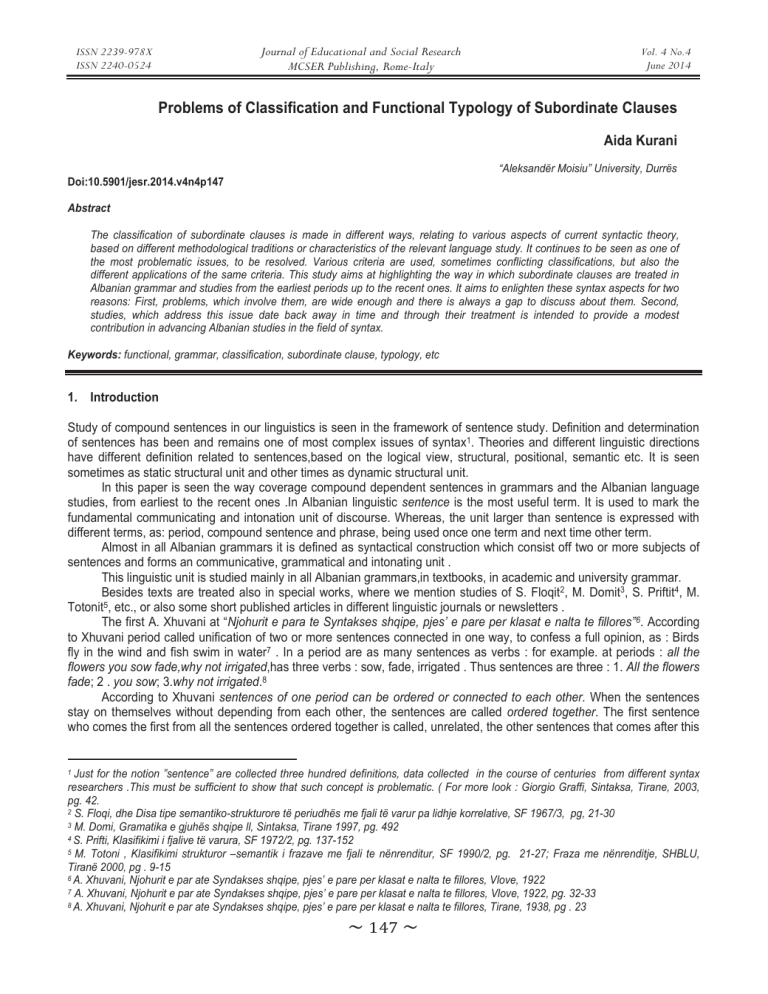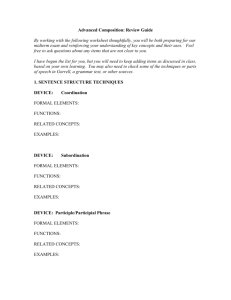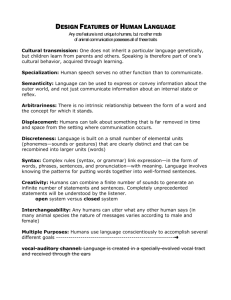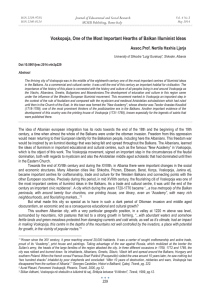Problems of Classification and Functional Typology of Subordinate Clauses Aida Kurani

ISSN 2239-978X
ISSN 2240-0524
Journal of Educational and Social Research
MCSER Publishing, Rome-Italy
Vol. 4 No.4
June 2014
Problems of Classification and Functional Typology of Subordinate Clauses
Aida Kurani
“Aleksandër Moisiu” University, Durrës
Doi:10.5901/jesr.2014.v4n4p147
Abstract
The classification of subordinate clauses is made in different ways, relating to various aspects of current syntactic theory, based on different methodological traditions or characteristics of the relevant language study. It continues to be seen as one of the most problematic issues, to be resolved. Various criteria are used, sometimes conflicting classifications, but also the different applications of the same criteria. This study aims at highlighting the way in which subordinate clauses are treated in
Albanian grammar and studies from the earliest periods up to the recent ones. It aims to enlighten these syntax aspects for two reasons: First, problems, which involve them, are wide enough and there is always a gap to discuss about them. Second, studies, which address this issue date back away in time and through their treatment is intended to provide a modest contribution in advancing Albanian studies in the field of syntax.
Keywords: functional, grammar, classification, subordinate clause, typology, etc
1.
Introduction
Study of compound sentences in our linguistics is seen in the framework of sentence study. Definition and determination of sentences has been and remains one of most complex issues of syntax 1 . Theories and different linguistic directions have different definition related to sentences,based on the logical view, structural, positional, semantic etc. It is seen sometimes as static structural unit and other times as dynamic structural unit.
In this paper is seen the way coverage compound dependent sentences in grammars and the Albanian language studies, from earliest to the recent ones .In Albanian linguistic sentence is the most useful term. It is used to mark the fundamental communicating and intonation unit of discourse. Whereas, the unit larger than sentence is expressed with different terms, as: period, compound sentence and phrase, being used once one term and next time other term.
Almost in all Albanian grammars it is defined as syntactical construction which consist off two or more subjects of sentences and forms an communicative, grammatical and intonating unit .
This linguistic unit is studied mainly in all Albanian grammars,in textbooks, in academic and university grammar.
Besides texts are treated also in special works, where we mention studies of S. Floqit 2 , M. Domit 3 , S. Priftit 4 , M.
Totonit 5 , etc., or also some short published articles in different linguistic journals or newsletters .
The first A. Xhuvani at “ Njohurit e para te Syntakses shqipe, pjes’ e pare per klasat e nalta te fillores” 6 . According to Xhuvani period called unification of two or more sentences connected in one way, to confess a full opinion, as : Birds fly in the wind and fish swim in water 7 . In a period are as many sentences as verbs : for example. at periods : all the flowers you sow fade,why not irrigated ,has three verbs : sow, fade, irrigated . Thus sentences are three : 1. All the flowers fade ; 2 . you sow ; 3.
why not irrigated .
8
According to Xhuvani sentences of one period can be ordered or connected to each other. When the sentences stay on themselves without depending from each other, the sentences are called ordered together . The first sentence who comes the first from all the sentences ordered together is called, unrelated, the other sentences that comes after this
1 Just for the notion ”sentence” are collected three hundred definitions, data collected in the course of centuries from different syntax researchers .This must be sufficient to show that such concept is problematic. ( For more look : Giorgio Graffi, Sintaksa, Tirane, 2003,
2 pg. 42.
S. Floqi, dhe Disa tipe semantiko-strukturore të periudhës me fjali të varur pa lidhje korrelative, SF 1967/3, pg, 21-30
3 M. Domi, Gramatika e gjuhës shqipe ll, Sintaksa, Tirane 1997, pg. 492
4 S. Prifti, Klasifikimi i fjalive të varura, SF 1972/2, pg. 137-152
5 M. Totoni , Klasifikimi strukturor –semantik i frazave me fjali te nënrenditur, SF 1990/2, pg. 21-27; Fraza me nënrenditje, SHBLU,
Tiranë 2000, pg . 9-15
6 A. Xhuvani, Njohurit e par ate Syndakses shqipe, pjes’ e pare per klasat e nalta te fillores, Vlove, 1922
7 A. Xhuvani, Njohurit e par ate Syndakses shqipe, pjes’ e pare per klasat e nalta te fillores, Vlove, 1922, pg. 32-33
8 A. Xhuvani, Njohurit e par ate Syndakses shqipe, pjes’ e pare per klasat e nalta te fillores, Tirane, 1938, pg . 23
̱ ͳͶ
̱
ISSN 2239-978X
ISSN 2240-0524
Journal of Educational and Social Research
MCSER Publishing, Rome-Italy
Vol. 4 No.4
June 2014 sentences is called first ordered together.
The sentences of one period are called connected to each other, when one or some of them are depending from one sentence, which is called the first sentence; the other sentences are called dependent. The definition of the period, from A. Xhuvani, is done in semantic basis. It is given as a meaning or as an “additional” meaning and antagonize the definition of the sentence that express an opinion or judgment show in speaking or written speech.
In the same line is also I. D. Sheperi 9 . To show completely an opinion, two or more simple sentences or compound sentences are connected with each other, and form a period. “Even a sentence is a period, when it shows complete the opinion” he clarifies. According to the role that they have in a period the sentences are main sentences or independent and dependent or second sentences.
Meanwhile J. Rrota 10 uses the term “extended sentence.” He emphasize that the sentence is a group of words that narrate a full opinion. It can be found alone, independent sentence, or connected to other sentences, extended sentence.
Justin Rrota distinguishes the syntax unit that is composed by two sentences, the main sentence and the dependent sentence and those sentences that contain three-four or more dependent or independent sentences.
K. Cipo, influenced by grammars of romance languages uses in his grammar the term “ period- a series of sentences with a full and continues meaning and corrected symmetrically.
He adds that a period can be called a whole sentence, when it is extended and express a full meaning. Ex” T he joy of this g reat victory was troubled from the bad news of Pal Dukagjini death”.
M.Domi in his 1954 grammar parallel with the term” period” uses the term “phrase”. He underlines, “These group of sentences that are used to express a full opinion, an uttermost opinion that a sentence express, are called period or phrase.” For the first time in our linguistic we came across with the term phrase.
S. Riza explains that units larger than simple sentences, for example compound sentences, are created and shaped by sequences of simple sentences, which are coordinated in accordance with the laws of grammar and language, creating larger units 11 .
The issue of the difference between the sentence and the period is has also dealt by S. Prifti 12 in his syntax, which is structured in two major parts: a. the syntax of the sentence and b. the syntax of the sentence (or period), the period is defined as a system of related sentences grammatically between them, which express a complete thought, finished.
In the work of M. Totoni we see a return of the term phrase in his studies. Since in the preface the researcher writes: "The phrase sentence and clauses is one of the most studied categories of Albanian syntax".
13 . Even in the continuation of dealing with the problems and features of the phrase, he uses the term "phrase", as the local phrase, time phrase, modal phrase, consequential phrase, etc.
According to the researcher, the term “phrase” means the syntactic discursive unit, that is characterized by finished intonation and the full meaning within a given context. For the author syntactic unit phrase is realized in a particular context or situation. It may consist of one or more sentences, but also by a single word, which can be supplemented by the context.
He explains the concept of the phrase simultaneously doing his difference from the concept of sentence. In terms of phrase and sentence is labeled the syntactic unit as a communicating unit and also as structural units. With the term
"sentence" it is understood the syntactic unit that is based on an elaborate verb. The phrase may have sentence structure or not ; it can be simple, when its structure conforms to the structure of the compound sentence, when its structure contains two or more sentences.
In the later texts of syntax for different levels of education in all subsequent reprints authored A. Jashari, L. Harito,
N. S. Bobrati Dako, N. Pepivani, Th. Thima are introduced in use names: compound sentence, replacing the term period and subordinate part, to replace the term dependent sentence. Definition and features of the period are provided more comprehensive and scientific in the Grammar of the Academy: "The period is the entire unit associated semantic, structural and with intonation, consisting of two or more predicative units in the sentence form, in certain relations between them. It is characterized by a single intonation line from a single intonation end, that sounds in the last sentence." 22
9 I. D. Sheperi, Gramatika dhe Sintaksa e gjuhës shqipe, Vlorë 1927.
10 At. J. Rrota, Sintaksi i shqipes, për klasat II,III,IV të shkollavet të mesme, Shkodër, 1942, f. 65.
11 S. Riza, Vepra 2, botim i Akademisë së Shkencave dhe të Arteve të Kosovës, Prishtinë, 1997, f. 516
12 Prifti, Sintaksa e gjuhës shqipe, pjesa I, Dispensa I, 1971
13 M. Totoni, Klasifikimi strukturor-semantik i frazave me fjali të nënrenditura, SF, 1990/2, f. 21.
̱ ͳͶͺ
̱
ISSN 2239-978X
ISSN 2240-0524
Journal of Educational and Social Research
MCSER Publishing, Rome-Italy
Vol. 4 No.4
June 2014
T. Topalli 14 from three themes period,phrase,compound sentence , supports period bringing the following arguments. a) etymologically responds better to the linguistic content of its components ; b) it is a term of long language tradition of great frecuency of usage in Albanian grammar ( syntax ),since a century ; c) it expresses very well the unit syntac hierarcy, marking a border with the paragraph and text (oversyntax unit) d) can not create confusion with other units, as well as the first two terms ; e) syntactic analysis is devided better into sentences (not in sections),which in most cases, today are called predicative units, because there is a lack of finished intonation (it is by the period) but they have always an expressed predicativity, as one of the two features of the sentence 1 .
2.
Results
As seen, from definitions,addaptation and terminologycal studies, in the Albanian language there is always a theoriticalsemanic distinction between a sentence and a predicative sentence but the terminological difference is never done.
The term period is the normative term used in the academy grammar 15 .
The difference between sentence and period is seen as structural .
They are distinguished only by structure, period has a more complex sturcture and a more full and dettailed content.
However we can say that period studies have brought a more deep concept of it,putting in evidence various compount elements of this syntax unit and their role in the building and function of period especially of the subordinated once .
In this work,we would like to use the term period to avoid any uncertainity regarding the used terms. The term period is the normative term of the albanian language and that is why we are concerned with this term.
On the other hand,we do not think that the replacement of a term with another solves even the conceptual problem related to them.
In our view the theory of period,phrase and compound sentence in Albanian language needs a review of the analysis in order to reflect the evolation of the Albanian language and it’s distinctive features.
References
Akademia e Shkencave, Gramatika e Gjuhës Shqipe II , Sintaksa, Malaka, Tiranë, 2002.
Cipo, K. , Gramatika e gjuhës shqipe për klasat e V-ta, VI-ta, VII-ta të shkollave 7-vjeçare, Tiranë, 1949.
Cipo, K., Sintaksa shqipe, Tiranë 1952 .
Dodbiba, L., Spasse, S., Gramatika e gjuhës shqipe , për kl V dhe VI të shkollave shtatëvjeçare, Tiranë, 1951
Domi, M., Gramatika e gjuhës shqipe, Sintaksa, Tiranë 1968
Dhima, Th., Gjuha shqipe, Sintaksa , SHBLU, Tiranë 2005, dhe Ribotim Tiranë 2008
Dhima, Th., Disa koncepte sintaksore në gramatikat e shqipes të gjysmës së parë të shek. XX , Seminari ndërkombëtar për gjuhën letërsinë dhe kulturën shqiptare, Prishtinë 2004, nr 23/1
Floqi , Disa tipe semantiko-strukturore të periudhës me fjali të varur në shqipen e sotme, Konferenca I e studimeve albanologjike, Tiranë
1965
Floqi, S., Çështje të fjalisë së përbërë në gjuhën shqipe, BSHSH, 3, 1955
Graffi, G., Sintaksa, Strukturat e ligjërimit, përkthyer nga B. Topalli, Tiranë 2003.
Totoni, M., Fraza me nënrenditje , Tiranë, 2000
TopallI, T. Fjali e përbërë, frazë apo periudhë ?, gjuha jonë, 1-4/2004.
Xhuvani, A., Libri i gjuhës shqipe, pj. II për klasat e nalta të fillores dhe të
Xhuvani, A., Njohunit e para të sintaksës shqipe për klasët e nalta të Fillores , Tiranë 1938
Xhuvani, A., Njohunit`e para të sintaksës shqipe, pjes` e parë për klasët e nalta të fillores, Vlorë 1922
14 T. Topalli, Fjali e përbërë, frazë apo periudhë?, Gjuha jonë, 1-4/2004, f. 83
15 Akademia e shkencave, Graatika e gjuhës shqipe II, Tiranë, 2002.
̱ ͳͶͻ
̱





